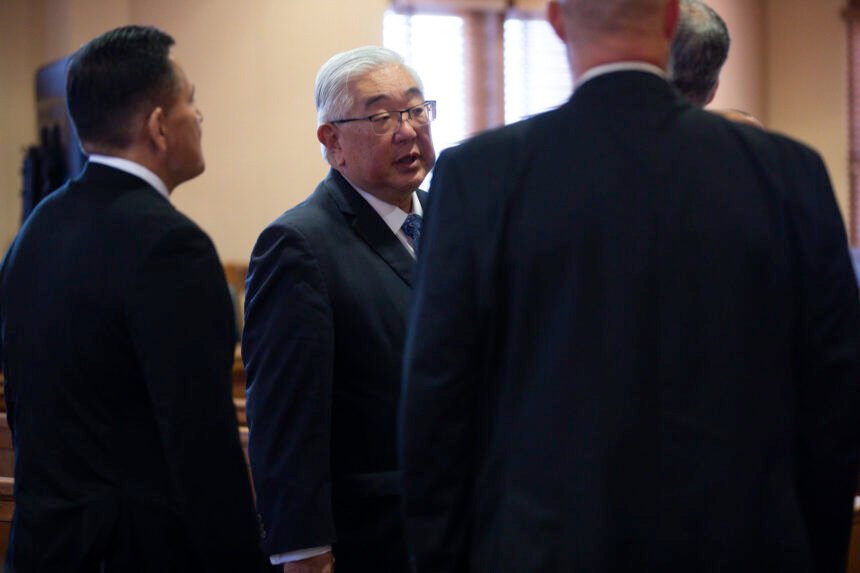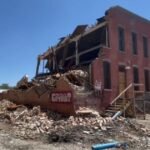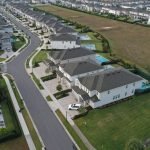While current city leaders appear to be all-in for a downtown redevelopment project that includes building a new Spurs arena and convention center hotel, Bexar County Judge Peter Sakai said Wednesday he wants to put county facilities first.
But he won’t do it at the cost of losing the Spurs.
At an event hosted by the Metro San Antonio Chamber, the official now in the third year of his first term as county judge, answered a set of wide-ranging questions on the “state of the county,” including economic development efforts, a leadership style based on accountability and his charge to staffers to improve customer service.
The proposed sports and entertainment district widely known as “Project Marvel,” and what it could mean for the county-owned Frost Bank Center, is where Sakai focused much of the discussion with Metro Chamber President and CEO Brett Finley.
Sakai said his first priority is improving and maintaining county facilities, he said, including the Spurs’ current home, the Freeman Coliseum and coliseum grounds.
Those venues need major upgrades unless they are to “sit there and rot” like Houston’s Astrodome, he said.
Sakai said he also wants to fulfill a commitment made to the East Side when the arena was built in 2002.
How those priorities will line up with a memorandum of understanding between the city and county will likely be up to voters.
“Once the Spurs leave [the Frost Bank Center], we’ll have two arenas that will perhaps be competing so we’ve got to have a business plan in order to make sure that those county facilities are upgraded,” he said. “I want to make sure the community understands I’m protecting the community first, and if I can, I’m going to do everything I can to keep the Spurs in town.”
Meanwhile, he said San Antonio Stock Show and Rodeo leaders are developing a business plan to utilize county facilities year-round, and will soon bring that plan and the organization’s needs to the county.
Sakai wants to see the nearby Willow Springs Golf Course also included in a redevelopment package, possibly through a public-private partnership. “That could be really a game changer,” he said.
But coming up with the funds through a county venue tax for improvements to county facilities — and having enough left over to help build a $1 billion Spurs arena — is going to be up to voters.
Spurs’ owners have been working with city officials on an ambitious sports district plan for more than a year — and even pushed the county to ask voters for money to fund the arena in the May municipal election — without disclosing the projected cost and revenue sources.
In February, commissioners voted 4-1 to give Sakai permission to start negotiating a potential deal for the Spurs arena.
Missing a statutory deadline for the May elections, the county is now targeting November. If the venue tax passes, it could provide up to $400 million for upgrades, according to county estimates.
Commissioners will take up the matter in the coming weeks and Sakai said he hopes the commissioners will vote unanimously to approve a measure that will ultimately contribute to the city’s sports district plan. “I cannot envision San Antonio without the Spurs,” he said.
He knows county residents are skeptical, however, because hard cost figures and other numbers have yet to be made public. Sakai promised that information is coming soon.
“What I’m wanting the public to understand … is that what we’re trying to do, we got to figure out how to make this a win-win, and that is something fundamental about for me that comes from my court experience,” he said.













